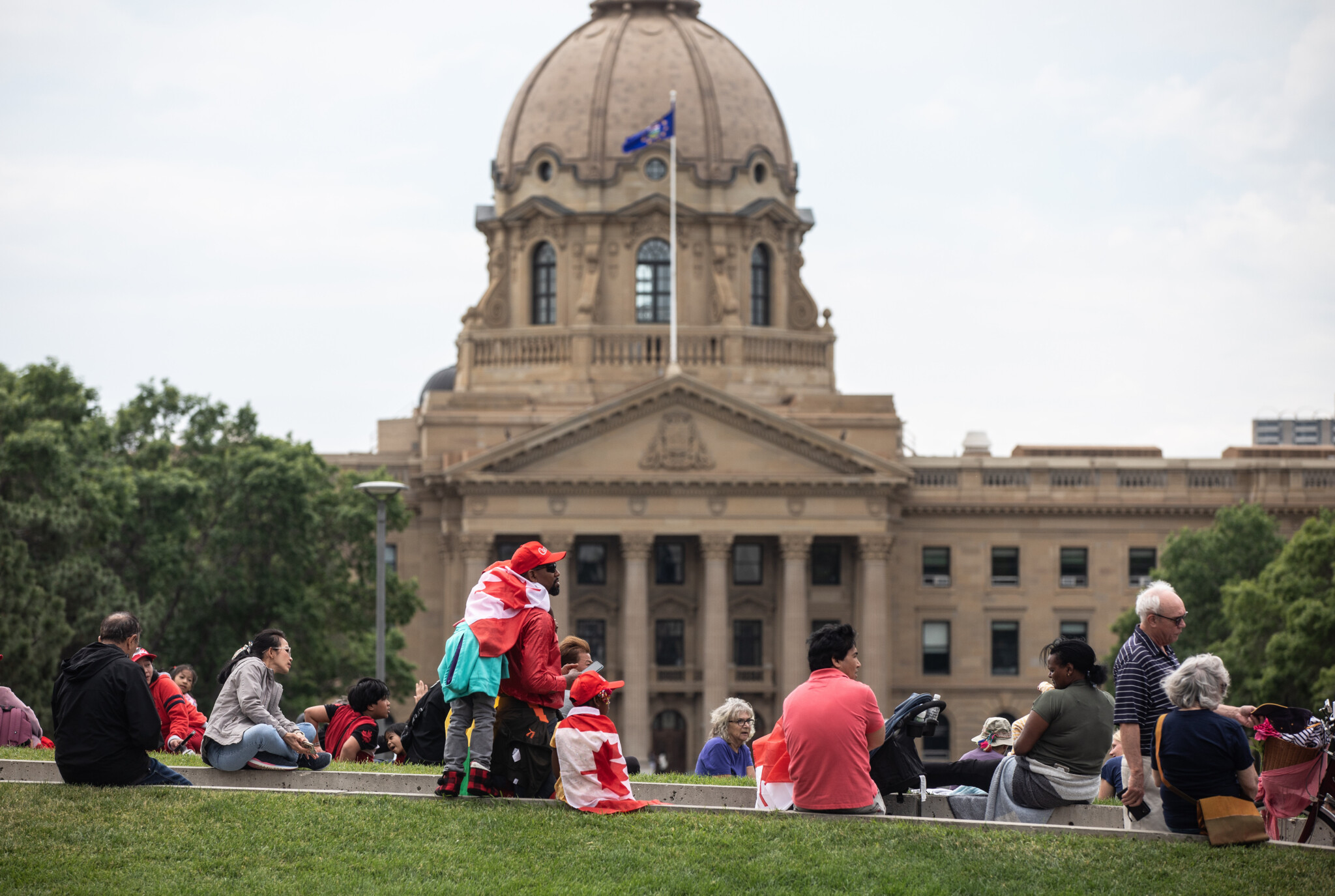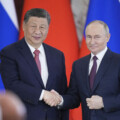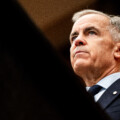Welcome to Need to Know, The Hub’s roundup of experts and insiders providing insights into the biggest stories, political developments, and policy announcements Canadians need to keep their eyes on.
For Albertans, separation is not a yes-no question
By Falice Chin, a freelance journalist based in Calgary and The Hub’s Alberta senior producer
Is it time for Alberta to separate from Canada? The question keeps coming back.
It has dominated headlines ever since the Liberal Party secured a surprise fourth consecutive term—despite winning just two of Alberta’s 37 seats on election night.
Pollsters quickly jumped on the issue, reporting attention-grabbing numbers: typically between 20 and 30 percent of Albertans say they’d support a so-called “Wexit.”
Then comes the asterisk: the majority of Albertans do not support separation. Some observers even point out that about as many Albertans voted Liberal—27.9 percent of the popular vote.
The separation question is typically framed in simple binary terms: are you for it or against it? That’s a necessity in top-line polling and reporting, but in real life, many Albertans’ feelings are far more nuanced.
This was particularly evident in the May 8 Angus Reid Institute poll, which included a squishier option of whether people would lean one way or another. The responses unfolded more on a spectrum, with the “lean toward leave” respondents pushing overall support for separation to 36 percent.
If we borrow from logic, the issue isn’t so much a yes-or-no proposition as an if-then scenario. That’s where things get more complicated, especially in light of Premier Danielle Smith’s demands for Prime Minister Mark Carney.To recap, Smith’s demands include: guaranteed access to tidewater for Alberta’s resources; an end to federal interference in provincial resource development, including repealing environmental and emissions laws; a veto over export restrictions; equal treatment in federal transfers and equalization.
Realistic or not, Smith’s so-called “Alberta Accord” is built on conditions.
“If these points can be agreed to by the federal government, I am convinced it will not only make Alberta and Canada an infinitely stronger and more prosperous country, but will eliminate the doubts a growing number of Albertans feel about the future of Alberta in Canada,” she said.
Conveniently, a few of those conditions were incorporated into the Angus Reid poll. And the numbers do swing significantly once they come into play. For example, a huge majority—60 to 70 percent—of those leaning toward separation said they’d change their minds if the government were to commit to building Energy East, scrapping the emissions cap, or repealing C-69.
A separate Leger poll found that 58 percent of Albertans believe federal government actions could influence how they view the province’s future within Canada.
So yes, many Albertans are angry—but they’re also persuadable.
Yet the hardcore rhetoric around Alberta independence often pulls the question back into a rigid binary, even though many of the pro-separation arguments are built on their own set of if-then assumptions:
If Alberta leaves, then other provinces will grant pipeline access due to international obligations.
If Alberta leaves, then Canada will negotiate in good faith.
If Alberta leaves, then equalization payments will no longer be a burden.
A lot of those ifs demand proper answers.
Meanwhile, Smith’s UCP government is lowering the threshold for citizen-led referendums. Pressed on whether she would act on a pro-separation vote, Smith says she will “respect the outcome.”
That political signal appears to have changed the tone of the conversation.
How else to explain why separation feels so plausible now? When asked whether the threat of secession should be taken more seriously or whether separation is a real possibility, a high proportion of Albertans say yes, even if they wouldn’t personally vote for it.
Most Albertans haven’t given up on Canada. But their frustrations run deep—and their support is often wrapped in ifs, buts, and maybes that resist easy categorization.
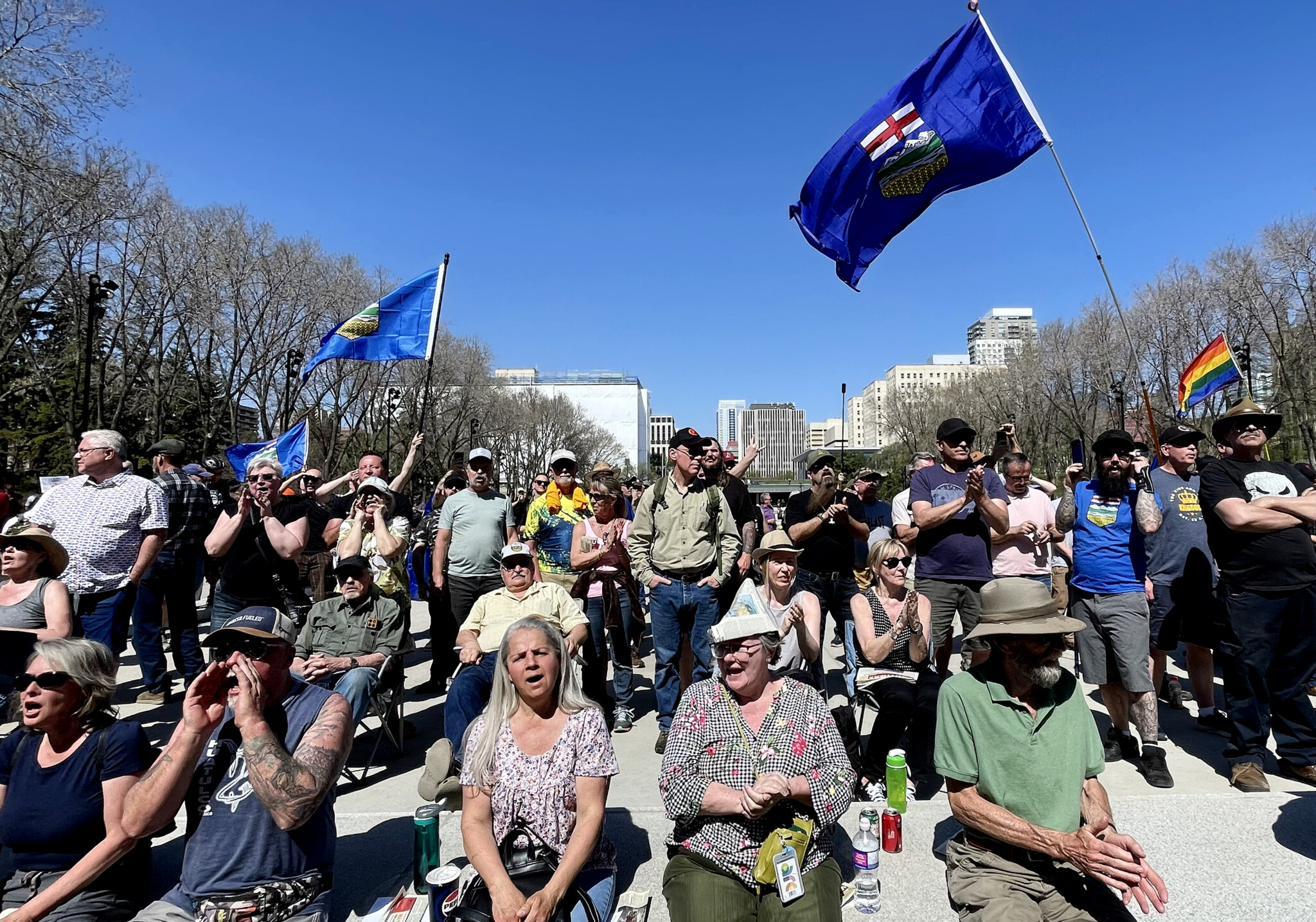
People gather during a rally at the Legislature in Edmonton on Saturday, May 3, 2025. Jason Franson/The Canadian Press.
Albertans are sick and tired of being told to sit and take it
By Mandi Johnson, vice president at Crestview Strategy
Pundits on national television shows, generally taped in Ottawa or Toronto, have been speculating about the sentiment in Alberta, patronizing an entire province because they clearly don’t understand what is occurring. What’s happening in Alberta isn’t a temper tantrum just to get attention—there are serious considerations as to whether the relationship we have with the federal government still works for us.
For decades, Ottawa has treated Alberta like the bratty younger brother it only calls when they want something. But here’s the thing: you can’t keep calling Canada a “strong partnership” while draining Alberta’s resources and sending our money overseas instead, ignoring our concerns, and talking down to us every time we push back. In the words of one Taylor Allison Swift, “don’t think it’s in the past. These kinds of wounds, they last and they last”
And now we see Albertans are officially entering their “leave it all behind” era.
A new Angus Reid poll says 36 percent of Albertans support leaving Canada. A month before that, it was 30 percent. That’s not just the grumblings of a few rural UCP voters. That’s a growing, organized, frustrated movement that is being ignored and mocked. And it’s not hard to see why.
Premier Danielle Smith recently introduced legislation to make it easier for Albertans to trigger a referendum, and that certainly doesn’t rule out one on secession.Under new rules, only 10 percent of voters would need to sign within 120 days to force a province-wide vote. For Albertans frustrated with our treatment from Ottawa, that’s a live wire waiting to be struck.
We’ve seen this film before. Back in 1982, a separatist from the Western Canada Concept actually won a seat in the Alberta Legislature, right in the then-constituency of Olds-Didsbury. It may have just been a short-lived protest vote then. But sometimes history rears its head, and we see ourselves right back where we were when we don’t learn the lessons of the past. (And yes, there’s a certain high-profile by-election in that same riding this year.)
Let’s not pretend this is all just noise. When Quebec held its 1995 referendum, the “Yes” side came within a single point of leaving Canada. The federal government had been sitting pretty with a 20-point lead in the polls…until the campaign started. Identity, frustration, and a sense of pride took over, and Canada nearly split in two.
Sound familiar?
I keep hearing people say, “Well, Alberta can’t just leave. There’s the Constitution. The Clarity Act. You need a clear question, a clear majority, and a national constitutional amendment.” That’s all true. But what happens if Albertans do vote to leave, and the House of Commons and the other provinces block it? The frustration will multiply, and we will have a real crisis on our hands.Just look across the pond at Brexit. People laughed off the idea that the U.K. could actually vote to leave the European Union. But when folks feel ignored long enough, especially rural, working-class voters, things change fast. All it took was a referendum to make a fringe idea mainstream, and so long, London.
This isn’t about waving a separatist flag. It’s about being sick and tired of being told to sit down and be quiet while decisions that shape our economy and our future are made in Ottawa boardrooms without us.Just ask Catalonia, where years of being dismissed by the central government can eventually lead. Following a vote declaring independence, we saw clashes in the streets and constitutional chaos. The result? A fractured Spain and a wound that still hasn’t healed.
Let’s be clear: if Alberta’s voice keeps being ignored, the chorus calling for separation will only get louder.
If Ottawa wants this federation to stay together, it needs to stop treating Alberta like the problem child and start treating us like a partner. Alberta has the natural resources needed to help our country grow in these uncertain times; we have the produce that people around the world desire, giving us a leading chance at expanding our trade relationships, and we have a world-class innovation hub that can build us all up.
For Ottawa, maybe it isn’t love, it isn’t hate, it’s just indifference. For Alberta, maybe everything has changed.
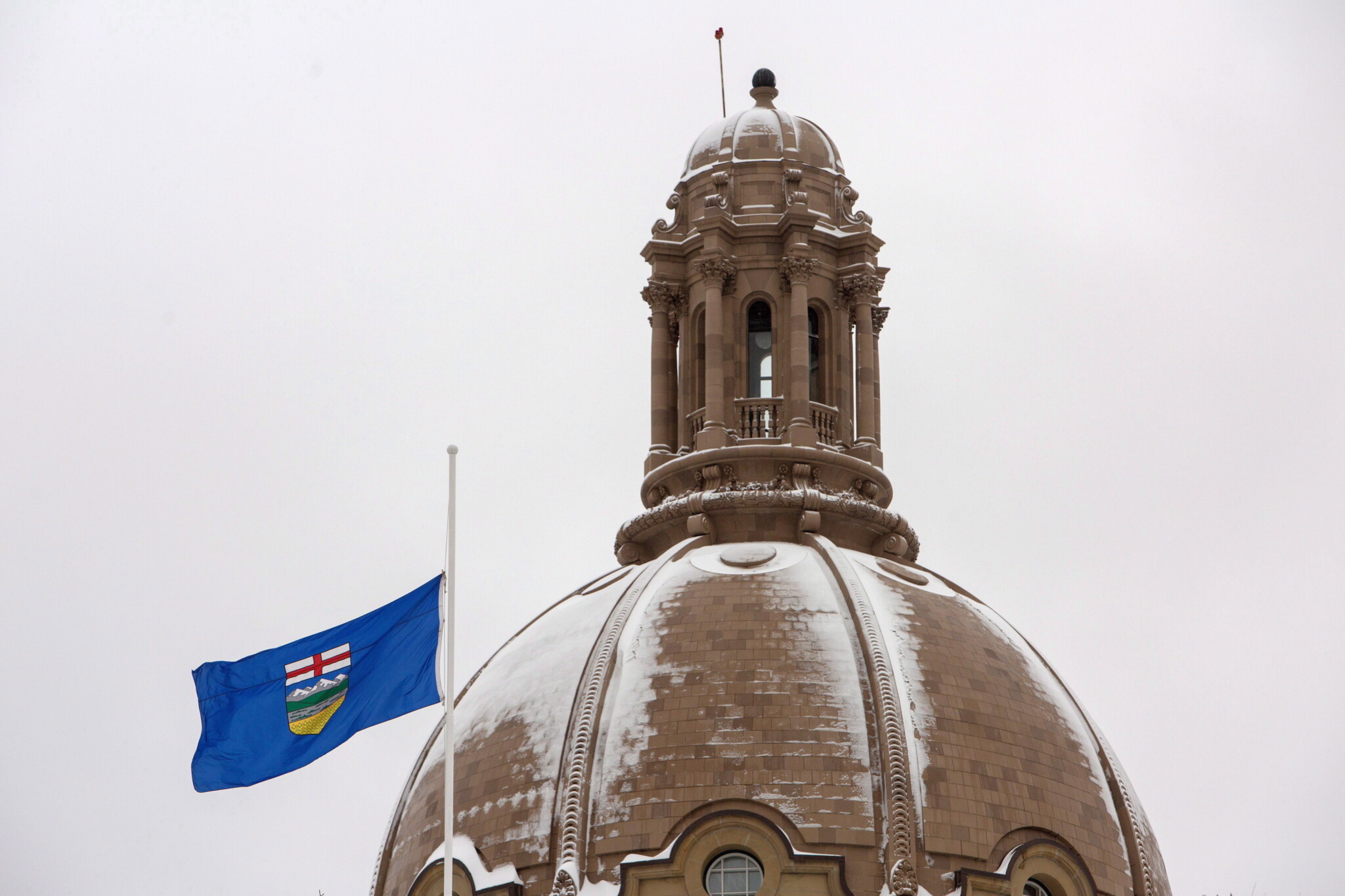
Alberta Legislature flags fly at half-mast in Edmonton, Alberta, on Friday October 14, 2016. Amber Bracken/The Canadian Press.
The Trump factor changes the entire equation
By Andy Crooks, retired lawyer, former chair of the Canadian Taxpayers Federation, and current chair of the Canadian Constitution Foundation
After the Quebec referenda and the Supreme Court reference on Quebec separation, the Clarity Act was passed in Canada, laying out the ground rules for any province desiring to separate.
It is a process statute. It seems designed to give the Central Canadian Laurentian elite the opportunity to delay, obfuscate, and generally prevent a province from departing. Any province that passed a separation motion in the legislature would trigger years of negotiation, consultation, litigation, inter-provincial conferences, commissions, papers, and studies. And all this before a separation referendum was put to the people.
And this represents only the first of the two hurdles.
The first is intra-Canadian: to achieve wording on a referendum, a majority vote, followed by an agreement to allow separation. The second hurdle is extra-Canadian: to achieve recognition by another country or countries.
To get the rest of Canada to agree on separation is difficult enough, but to achieve statehood, the province would need recognition from other countries—nations prepared to say, “We acknowledge you as an independent state and will recognize you and deal with you to make treaties, agreements, and exchange diplomats.”
During the intra-Canadian negotiations, countries with their own separatist movements—Spain, the U.K., Turkey, and others—would actively resist the creation of any new state born of secession and would preemptively declare that they would not recognize its independence. The United States of old, wanting a stable northern border, would either remain silent or also preemptively declare a refusal to recognize statehood for the separatists. And U.S.-sponsored bodies, such as the World Bank, various UN Agencies, and others, would hew the same line. This would all be fodder for the delays and tactics of the Laurentians.
But we have a new paradigm.
Imagine a province taking a small step towards separation now, floating a trial balloon or holding a conference to consider the idea. Nothing untoward, just an exploratory step. Imagine further the Mar-a-Lago agent of change posting to social that the new province would be recognized as a new state immediately. And the post might include the promise of a new trade and security deal.
That’s a whole different story.
Britain would remain silent as they have with the 51st-state controversy. Europe would remain on the sidelines. Most of the external world would shrug or agree with the agent of change. Canada is not worth the bother, and agreeing with emanations from Mar-a-Lago is not a bad thing.
And what a wake-up call for the Laurentian elites. A couple of White House press releases could change the game.
The conversations around equalization, immigration, and representation in government, courts, and the deep state would suddenly become part of the art of the deal. Major projects like pipelines and tidewater access would suddenly become real. The dialogue around national defence might even change.
Don’t mistake my intention—to paraphrase Lucien Bouchard, I am not as much interested in separation as I am interested in a new arrangement with Canada. And the agent of change in Mar-a-Lago might help achieve this goal.
